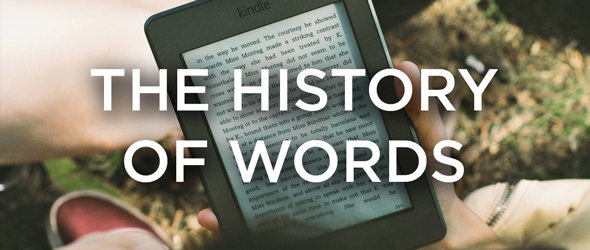
The History of Words – 6 Etymological Processes
Did you talk about googling anything today? If you did, you said a word that was not a part of the English language a few years ago. Why is it acceptable to use the word google as a verb today? How did it enter the English language? I’ll answer all those questions and more today as we look at the history of words.
We don’t often think of where words come from, but that’s what looking at etymology is all about. Without the processes of new words entering the English language, we would never have had the words Microsoft, smog, googled, ad, or hoovering. Interestingly, there are six different ways that words enter the English language.
Here are the 6 etymological processes:
#1 Borrowing
Borrowing is the process of taking (or as some like to say stealing) words from other languages. English has borrowed hundreds of words from other languages. Here is a sampling of a few of the more commonly used words that we have borrowed, along with their language of origin. If you know any words that English borrowed from your language, be sure to comment below with the word and language of origin.
Examples of borrowed words include:
- Arabic: alcohol, almana, borax, candy, gazelle, giraffe, hazard, jar, lilac, lemon, lime, magazine, mocha, monsoon, mummy, orange, sash, soda, sofa, sugar, tahini, zero
- Chinese: chow, feng shui, ginseng, gung ho, ketchup, kumquat, lo mein, silk, tai chi, tea, wok
- Dutch: aardvark, aloof, blink, block, blow, booze, bush, cookie, deck, dope, drive, gas, gin, hoist, hooky, kill, landscape, luck, mannequin, mart, pickle, pit, split, stove, walrus, wagon, yacht
- French: a la carte, a la mode, avant-garde, ballet, bon appetit, bon voyage, cafe, chauffeur, chic, cliche, croissant, cul-de-sac, eclair, fiance, fiancee, genre, hors d’eourves, jewel, rapport, resume, RSVP, vignette
- German: Alzehimer’s, aspirin, blitz, dachshund, delicatessen, diesel, Fahreheit, hamburger, kindergarten, pretzel, sauerkraut, strudel, waltz
- Greek: atlas, Bible, biography, captain, category, center, choir, code, cost, democracy, diagnosis, harmony, hero, hexagon, horizon, mathematics, meteorology, microscope, orphan, philanthropy, photo, physics, planet, psalm, scene, school, star, syllable, symbol, talent
- Hindi: bandana, bangle, bungalow, cot, dungaree, jungle, loot, pajamas, shampoo
- Italian: archipelago, artisan, balcony, bomb, bronze, cameo, cappuccino, carpet, cartoon, facade, gallery, graffiti, macaroni, mafia, mascara, mosaic, orchestra, piano, spaghetti, umbrella, vista
- Japanese: haiku, karaoke, daikon, shiitake, sensei, shiatsu, sushi, tempura, tsunami, tycoon, wasabi
- Latin: actor, agriculture, creditor, December, dictator, dilemma, diploma, doctor, drama, editor, exit, extreme, focus, gladiator, icon, idea, instructor, labor, junior, liberate, major, minor, motor, museum, nausea, person, possess, quota, radius, recipe, senior, stadium, status, trio, tutor, veto
- Native American languages: chipmunk, igloo, kayak, moccasin, moose, pecan, squash, teepee, toboggan, tomahawk, totem
- Old Norse: anger, birth, cake, egg, husband, leg, reindeer, root, Thursday, tight, trust, want, window, wise
- Portuguese: caramel, cashew, coconut, cougar, flamingo, piranha, savvy, tapioca
- Russian: intelligentsia, kefir, mammoth
- Spanish: albino, alfalfa, avocado, banana, barbecue, curro, cafeteria, chili, chocolate, cigar, embargo, hammock, macho, maize, margarita, matador, mesa, mosquito, patio, plaza, rach, rodeo, salsa, tobacco, taco, tango, tornado, tuna, vanilla
- Turkish: baklava, kaftan, khan, shaman, yogurt
#2 Compounding
Compounding is the joining of two separate words. Many words are combined, or compounded, together in English.
Examples of compounded words include:
- book + case = bookcase
- dog + house = doghouse
- finger + print = fingerprint
- sun + burn = sunburn
- text + book = textbook
- wall + paper = wallpaper
- water + bed = waterbed
Blending is a specific type of compounding that takes place when parts of two separate words come together to form a new word. The first part of one word compounds with the last part of another word, and it forms a new word.
Examples of blended words include:
- binary + digit = bit
- breakfast + lunch = brunch
- Channel + tunnel = Chunnel
- motor + hotel = motel
- smoke + fog = smog
- Spanish + English = Spanglish
- television + broadcast = telecast
#3 Clipping
Clipping is the process of when a words of more than one syllable is reduced to a shorter form. This is one of the more popular new word formation processes today. Young people, especially, often clip long words into shorter words.
Examples of clipped words include:
- ad from advertisement
- adorbs from adorable
- bra from brassiere
- condo from condominium
- fan from fanatic
- flu from influenza
- fridge from refrigerator
- phone from telephone
- presh from precious
Names are often clipped. Here are some examples of commonly clipped English names:
- Bob from Robert
- Ed from Edwin
- Jen from Jennifer
- John from Jonathan
- Meg from Megan
- Sam from Samuel or Samantha
- Tom from Thomas
#4 Conversion
Conversion is when the function of a word is changed. This process is when the part of speech changes. Many nouns have converted to be used as verbs.
Examples of converted words include:
- nouns to verbs: bottle, butter, chair, vacation
- verbs to nouns: cheat, doubt, hand out, hire
#5 Coinage
Coinage is the term used to describe the invention of completely new terms. Though this is not extremely common in everyday English use, it is often necessary when creating business names.
Examples of coined words include:
- aspirin, kleenex, nylon, teflon, vaseline, zipper
For a closer look on how many businesses coined their names, check out this list of company name etymologies.
One type of coinage is the development of words through acronyms. Some acronyms are referred to by their initials (ex: CIA, USA, NBA), but other acronyms make the transition into being referred to by single words (ex: scuba, radar, laser, PIN).
#6 Derivation
Derivation is the most common process of word production. Derivation is accomplished when affixes (suffixes and prefixes) are added to words.
Examples of derivatives include:
- mis- + lead = mislead
- dis- + respect + -ful = disrespectful
- kind + -ness = kindness
- care + -less = careless
- un- + rule + -y = unruly
(#7) Multiple Processes
Of course, some words use multiple processes to find their place in the English language. Let’s go back to the example of google, the verb. Google, the company, first chose their name by the process of coinage. They created a new word, based on the misspelling of the word googol, which is the number 1, followed by 100 zeros. Shortly after people started using Google to search for information on the internet, it underwent conversion from a noun to a verb.
What words has English borrowed from your native language? What coined words have you come up with? Comment below to let me know all about how etymology interests you.


